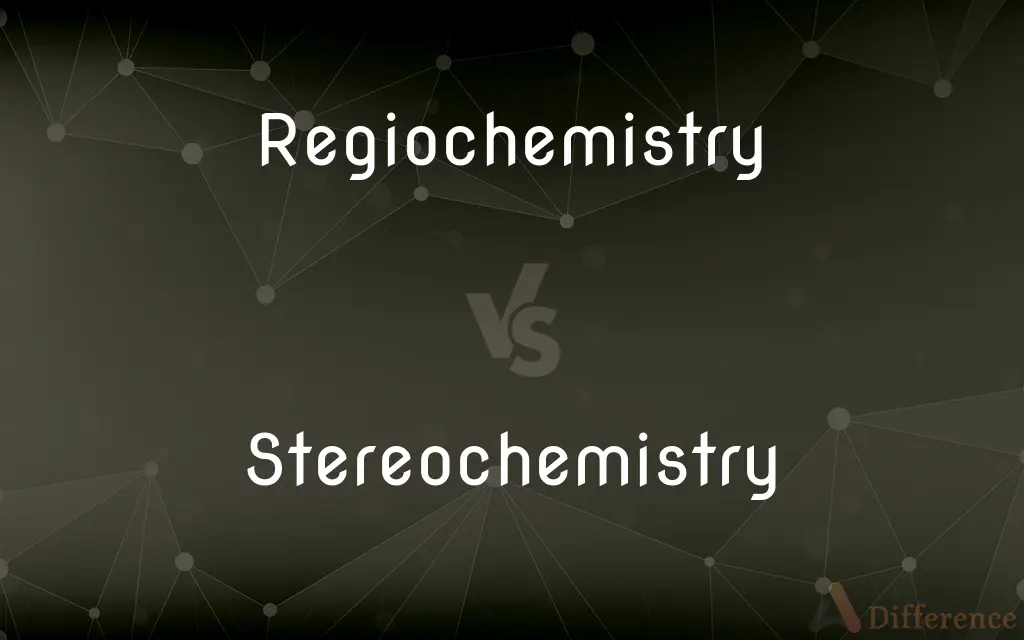Regiochemistry vs. Stereochemistry — What's the Difference?
By Tayyaba Rehman — Updated on September 20, 2023
Regiochemistry refers to the specific arrangement of atoms in a molecule, focusing on where reactions occur. Stereochemistry is concerned with the spatial arrangement of atoms within a molecule, including isomer configurations.

Difference Between Regiochemistry and Stereochemistry
Table of Contents
ADVERTISEMENT
Key Differences
Regiochemistry is a branch of chemistry that deals with the orientation and placement of substituent groups during chemical reactions. Stereochemistry, on the other hand, is focused on the spatial arrangement of atoms or groups within molecules, often concerning isomers.
Regiochemistry often plays a role in determining the outcome of chemical reactions, such as electrophilic addition reactions. Stereochemistry considers issues like chirality and is important in understanding optical activity and enantiomers in organic compounds.
In regiochemistry, it's crucial to know which carbon atom or position on a ring system a substituent will attach to during a reaction. In stereochemistry, it's more about understanding how the same molecular formula can have different spatial arrangements, resulting in different physical and chemical properties.
Regiochemistry helps chemists predict where on a molecule a reaction is most likely to occur. Stereochemistry is vital in understanding how molecules interact with biological systems, as the spatial arrangement can influence a molecule's biological activity.
Comparison Chart
Focus
Where reactions occur on a molecule
Spatial arrangement of atoms in a molecule
ADVERTISEMENT
Importance
In predicting reaction outcomes
In determining isomer properties
Applications
Organic reactions, synthesis
Drug design, biological interactions
Conceptual Basis
Orientation and placement of substituents
Chirality, isomer configurations
Examples
Markovnikov's rule, Zaitsev's rule
Optical isomers, geometric isomers
Compare with Definitions
Regiochemistry
Concerns the orientation and location of substituents.
Understanding the regiochemistry helped us predict the major product.
Stereochemistry
Study of the spatial arrangement of atoms in molecules.
Stereochemistry plays a key role in drug design.
Regiochemistry
Determines which position a substituent will attach to.
Regiochemistry guided us in selecting the reaction conditions.
Stereochemistry
Affects physical and chemical properties of substances.
Stereochemistry is responsible for the different taste of enantiomers.
Regiochemistry
Applies often in organic synthesis and reactions.
Regiochemistry is crucial in planning complex organic syntheses.
Stereochemistry
Concerns isomers with the same connectivity but different arrangements.
The stereochemistry of the molecule was confirmed by X-ray crystallography.
Regiochemistry
Affects the outcome and yield of chemical reactions.
Incorrect regiochemistry can lead to undesired products.
Stereochemistry
Includes concepts like chirality and optical activity.
Stereochemistry is essential in understanding enantiomers.
Regiochemistry
Study of the preferred sites of chemical reactions in a molecule.
The regiochemistry of the reaction was consistent with Markovnikov's rule.
Stereochemistry
Influences biological activity and interactions.
The stereochemistry of the ligand affected its binding affinity.
Regiochemistry
(chemistry) The chemistry of regioselective reactions
Stereochemistry
Stereochemistry, a subdiscipline of chemistry, involves the study of the relative spatial arrangement of atoms that form the structure of molecules and their manipulation. The study of stereochemistry focuses on stereoisomers, which by definition have the same molecular formula and sequence of bonded atoms (constitution), but differ in the three-dimensional orientations of their atoms in space.
Stereochemistry
The branch of chemistry that deals with spatial arrangements of atoms in molecules and the effects of these arrangements on the chemical and physical properties of substances.
Stereochemistry
The branch of chemistry that involves the spatial arrangement of the atoms of molecules, and studies how this affects the physical and chemical properties of such species
Stereochemistry
The effect of such spatial arrangement on the chemistry of a particular compound
Common Curiosities
Is Regiochemistry important in organic reactions?
Yes, regiochemistry is crucial for predicting the outcomes of organic reactions.
What are common applications of Regiochemistry?
Regiochemistry is often applied in organic synthesis and in predicting the outcome of reactions.
How does Regiochemistry affect chemical reactions?
Regiochemistry influences where on a molecule a reaction will occur, affecting the final product.
Are there rules in Regiochemistry?
Yes, such as Markovnikov's and Zaitsev's rules that help predict reaction outcomes.
What is Stereochemistry?
Stereochemistry deals with the spatial arrangement of atoms in a molecule and is concerned with issues like chirality and isomerism.
Is Stereochemistry vital for drug design?
Absolutely, the spatial arrangement in stereochemistry can significantly affect a drug's efficacy.
How does Stereochemistry affect biological systems?
Stereochemistry can influence how a molecule interacts with biological systems, affecting its biological activity.
What is Regiochemistry?
Regiochemistry is the study of where reactions occur on a molecule, often focusing on the orientation and placement of substituents.
What are common applications of Stereochemistry?
Stereochemistry is commonly used in drug design and in studying biological interactions.
Share Your Discovery

Previous Comparison
Culture vs. Diversity
Next Comparison
Cyme vs. CorymbAuthor Spotlight
Written by
Tayyaba RehmanTayyaba Rehman is a distinguished writer, currently serving as a primary contributor to askdifference.com. As a researcher in semantics and etymology, Tayyaba's passion for the complexity of languages and their distinctions has found a perfect home on the platform. Tayyaba delves into the intricacies of language, distinguishing between commonly confused words and phrases, thereby providing clarity for readers worldwide.














































